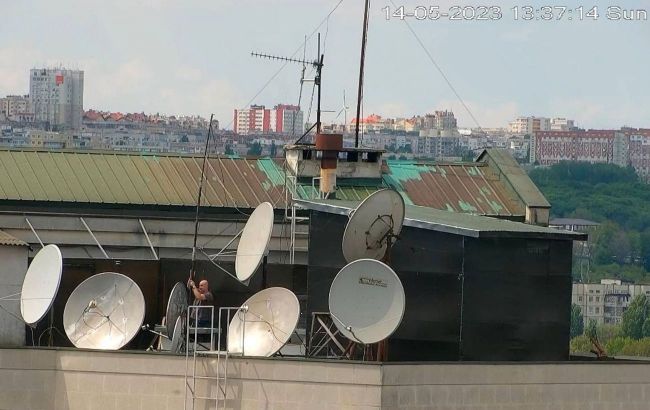Russian embassy in Moldova allegedly involved in espionage
 Russia is monitoring Moldova using antennas on the roof of the Russian embassy (theins.ru)
Russia is monitoring Moldova using antennas on the roof of the Russian embassy (theins.ru)
The number of transmitting devices on the roof of the Russian embassy in Chisinau is growing every year. Special services use them for surveillance, according to an investigation by Jurnal TV and The Insider.
Moldovan journalists from Jurnal TV counted a staggering 28 dishes and antennas which transmit or receive signals, installed on both the embassy's rooftop and an adjacent building housing diplomats and staff. This number far surpasses the record holder, the Russian Embassy in Belgium, which has 17 antennas, making Chisinau a hub for espionage equipment.
The investigation also revealed the presence of 23 officers from the Technical Management of the Foreign Intelligence Service on the embassy's rooftop.
These parabolic antennas have diverse functionalities, such as satellite communication, microwave signal relay, and boosting the signal of wireless internet routers. Additionally, they can be used to track the locations of ships, aircraft, and guided missiles. Parabolic antennas are capable of intercepting satellite phone signals, like those from the Thuraya system, enabling eavesdropping on phone conversations across several European countries.
Yagi-Uda antennas are capable of intercepting local police, taxi drivers, and air traffic controllers' radio communications. The wideband disc-cone transceiver antenna with a circular radiation pattern is used for two-way communication within a direct line of sight range of up to 100 km, facilitating direct communication with the pro-Russian entities in Transnistria and Gagauzia.
These antennas are also employed for short messaging with satellites in space, allowing the rapid transmission of vast amounts of information in a matter of seconds. Russian embassies worldwide feature such satellite antennas, which are used by the Russian Main Intelligence Directorate, Foreign Intelligence Servce, and the 5th Directorate of the Federal Security Service for various intelligence purposes.
The investigation reports that Russian intelligence in Moldova began to exhibit heightened activity since 2015 when Moscow made a bet on the socialist Igor Dodon, who took the presidency of Moldova a year later. Dodon's pro-Kremlin stance necessitated the backing of friendly intelligence agencies, leading to an influx of Russian officers and Moldova's Presidential Department for Interregional and Cultural Relations with Foreign Countries, forming a core group within Chisinau.

